Founded six years ago, Ecoprise designs, builds and installs clean energy products in Nepal for the underserved, energy-poor communities in order to create positive economic, environmental and social impact. Ecoprise recently started AgroHub, a pay-as-you-go service-based business model that aims to provide access to solar-powered infrastructure for remote underserved farming communities. These hubs provide farmers with access to equipment for irrigation, clean drinking water, food-processing and refrigerated post-harvest storage as a service, with ownership of equipment remaining with AgroHub or Ecoprise. The WDI intern, Matthew Carney, developed a theory of change report and a business plan for Ecoprise’s AgroHub model as part of its efforts to bring solar-powered agricultural services to subsistence farmers in the western Nepal region of Terai.
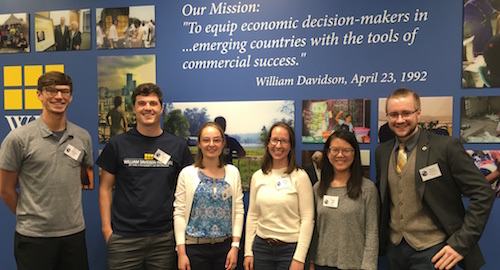
WDI’s 2018 summer interns before they set off on their voyages.
Over the years, WDI’s summer interns have faced unique challenges as they have conducted their work across the globe for the Institute and its partners. Impassable roads, extreme weather, the occasional wild animal. An active volcano can now be added to the list.
WDI intern Nadia Putri spent her summer in Bali, Indonesia working with East Bali Cashews on quality improvement projects, measuring the company’s impact on women and developing a U.S. market entry strategy. She also got an up close look at emergency preparedness.
“It was really beautiful, but a bit scary at the same time for someone who has never seen anything like it before,” she wrote of watching the sparks of lava and plume of smoke rise from the crater near where she was working. The cashew factory was outside the evacuation zone but management kept a daily eye on the volcano in case conditions changed. Earthquakes in the region have claimed nearly 400 lives during August.
Putri was one of six WDI interns working internationally this summer. Some, like Putri, have returned to the University of Michigan campus; others are finishing up their work and will be back in Ann Arbor soon. While overseas, the interns contributed to a blog to chronicle not only their work but also the experience of living in a foreign land. WDI has highlighted some of the work below and the full blog chronicling interns’ experiences is available here.
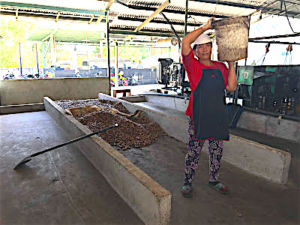
East Bali Cashews where Putri worked sources sustainably grown cashews from nearby smallholder farmers and processes them in a factory located in a remote village in one of Bali’s poorest regions. Since its launch in 2012, the company has integrated various social missions in and around its cashew processing operations, including community improvement and women’s empowerment.
Putri, a Ross School of Business MBA candidate, said factory workers were very supportive of her work and willing to explain how the company has impacted them. One employee recalled being hired after graduating from high school and is now in charge of 50 workers.
“At the factory, everyone is very welcoming and open to share their stories,” Putri wrote in her blog. “It’s especially humbling to see such high curiosity and willingness to learn from the factory employees. This serves as my daily reminder that (the) situation you grew up or lived in does not define who you could be.”
In Kenya, Andrea Arathoon, a School of Public Health graduate student, was tasked with helping a local maternity hospital reduce costs and increase patient volumes to achieve sustainability while also maintaining quality. One intervention Arathoon worked on for Jacaranda Maternity is a new outpatient care checklist for prenatal visits.
 The checklist is designed to improve patient processing within the outpatient clinic. This improved flow will reduce wait times and result in more efficient consultations, thus increasing patient volume and reducing costs, Arathoon wrote. She ensured the checklist followed the World Health Organization and Kenya Ministry of Health guidelines. The hospital’s doctors, nurses and administrative staff were consulted, and everyone was trained on how to properly use the new tool.
The checklist is designed to improve patient processing within the outpatient clinic. This improved flow will reduce wait times and result in more efficient consultations, thus increasing patient volume and reducing costs, Arathoon wrote. She ensured the checklist followed the World Health Organization and Kenya Ministry of Health guidelines. The hospital’s doctors, nurses and administrative staff were consulted, and everyone was trained on how to properly use the new tool.
“I am very excited about my summer project and the impact that it can have in improving maternity care for women and children in the country,” Arathoon wrote on the blog.
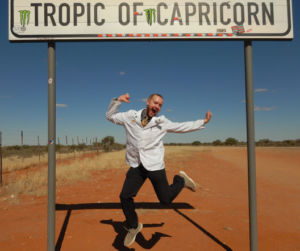
Across Africa on the Atlantic coast, Mason Benjamin is working in Namibia on pharmacy workforce development and hospital pharmacy practice. Benjamin, a College of Pharmacy graduate student, joined a collaborative project between WDI and the International Pharmaceutical Federation Hospital Pharmacy Section. The goal of the project, which includes the University of Namibia School of Pharmacy, is to increase the capacity of hospital pharmacists in Namibia through in-country diagnostics and technical assistance.
Benjamin has been traveling all across the country to visit hospital pharmacies in different regions to develop a landscape analysis of hospital pharmacy practices at both private and public hospitals. Before his site visits began, Benjamin attended the Medication Utilization Review In Africa (MURIA) conference, where he learned about pharmacy practice not only in Namibia but also across Africa.
“I was aware of how different the healthcare system in the United States might be from anywhere else in the world, but always felt that researching other systems online had its limits,” Benjamin wrote in the blog. “I much prefer to learn right from the source and in person, so I was grateful for the opportunity to ask questions to practicing pharmacists from over a dozen different African countries about how things worked in their setting.”
In India, the population of cities is expected to increase by 250 million people in the next 20 years, making employment a crucial need for the new transplants. Ross School of Business MBA student Chris Owen is working with MADE (Michigan Academy for the Development of Entrepreneurs) and its Madurai-based partner Poornatha, which is designing an affordable, world-class coaching curriculum for entrepreneurs in emerging economies. MADE was founded by WDI and U-M’s Zell Lurie Institute.
Owen is identifying best practices of existing coaching programs in India and other emerging economies, conducting a needs assessment of entrepreneurs in Madurai and developing a framework and training curriculum for how coaches will be identified, on-boarded and trained.
“By investing in strong local economies, India can address its dual-challenges of rapid urbanization and rising unemployment,” Owen wrote on the intern blog. “Indeed, for this reason, entrepreneurship in India – and the work of Poornatha – is becoming increasingly important.”
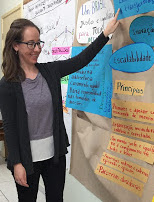 In Brazil, Rebecca Grossman-Kahn – a student at Ross and the U-M Medical School – is developing a tool to assess the social impact of the gender equality programs of Plan International’s Brazil office. Plan International has a long history of advocating for children’s rights but recently decided to focus its work in Brazil on promoting girls’ rights and equality. Gender roles in Brazil tend to be rigid and many girls stop studying in middle or high school to help with housework at home, Grossman-Kahn wrote on the blog. She attended a staff retreat to strategize on how to combat resistance from community members and organizations regarding Plan’s new focus on gender.
In Brazil, Rebecca Grossman-Kahn – a student at Ross and the U-M Medical School – is developing a tool to assess the social impact of the gender equality programs of Plan International’s Brazil office. Plan International has a long history of advocating for children’s rights but recently decided to focus its work in Brazil on promoting girls’ rights and equality. Gender roles in Brazil tend to be rigid and many girls stop studying in middle or high school to help with housework at home, Grossman-Kahn wrote on the blog. She attended a staff retreat to strategize on how to combat resistance from community members and organizations regarding Plan’s new focus on gender.
While at the retreat, a new World Bank report was released that showed girls who complete secondary education can expect to earn twice as much as those with no education.
“Studies like this can help get community leaders on board with Plan’s mission,” Grossman-Kahn wrote.
In Nepal, nearly two out of three working people are farmers. But the country’s rugged topography and lack of infrastructure makes it difficult to farm year-round despite a lengthy monsoon season. Additionally, in rural Nepal, only 5 percent of the population has reliable access to electricity. But the country has more than 300 days of sunshine, making it a perfect candidate for solar-powered agricultural services.
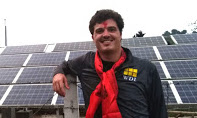 Matthew Carney, a dual degree student at Ross and the U-M School for Environment and Sustainability, spent the summer with the solar startup Ecoprise to help bring solar-powered agricultural services to subsistence farmers in the Terai region of Nepal that borders India. AgroHub, a pay-as-you-go service-based business model recently started by Ecoprise, provides access to solar-powered infrastructure for remote, underserved farming communities. These hubs provide farmers with access to equipment for irrigation, clean drinking water, food-processing and refrigerated post-harvest storage as a service.
Matthew Carney, a dual degree student at Ross and the U-M School for Environment and Sustainability, spent the summer with the solar startup Ecoprise to help bring solar-powered agricultural services to subsistence farmers in the Terai region of Nepal that borders India. AgroHub, a pay-as-you-go service-based business model recently started by Ecoprise, provides access to solar-powered infrastructure for remote, underserved farming communities. These hubs provide farmers with access to equipment for irrigation, clean drinking water, food-processing and refrigerated post-harvest storage as a service.
AgroHub has proved very successful for those farmers who have used it, allowing them to irrigate more land during the winter and monsoon seasons and reducing the use of diesel-powered water pumps that saves money. Carney’s task is to develop a plan to bring the service to farmers in western Nepal.
“Solar-powered agriculture presents an opportunity to raise the living standards of millions of rural Nepali farmers in a sustainable fashion,” he wrote. “It would be a shame to waste it.”
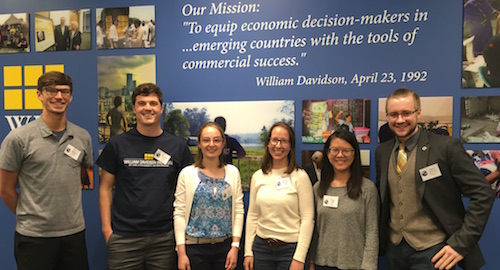
Six U-M graduate students are participating in the 2018 WDI Global Impact Internship program.
When Rebecca Grossman-Kahn was in high school, she was a volunteer with Amigos de las Américas, a youth leadership and cultural exchange program that partners with Plan International, a global development and humanitarian organization. While an undergrad at Stanford University, she worked in Honduras and Nicaragua for the organization.
“I just loved it,” she said. “I loved living in a different place, I loved speaking Spanish.”
So when the Ross School of Business MBA candidate and University of Michigan Medical School student was looking to create her own summer internship, she reached out to several organizations. The first to respond was Plan International, which works to empower children – especially girls.
“They were interested in revamping their evaluation program and I knew WDI worked in performance measurement,” Grossman-Kahn said.
She pitched the partnership to WDI as a student-initiated internship and it was approved. In mid-June, she will head to Brazil to develop a survey tool Plan International will use to assess the impact of their programs. In addition to student-initiated internships, WDI also develops student summer opportunities along with its partners.
Grossman-Kahn is one of six U-M graduate students participating in the 2018 WDI Global Impact Internship program. The students represent the Ross School of Business, the School of Public Health, the College of Pharmacy, the School for Environment and Sustainability (SEAS) and the Medical School. They will work in Brazil, India, Indonesia, Kenya, Namibia and Nepal, and support the work of WDI initiatives in Education and its Entrepreneurship Development Center, Energy, Healthcare, Performance Measurement and Scaling Impact. All of the interns have met with their respective WDI initiative leaders and will continue to keep in touch once in the field.
Colm Fay, who leads WDI’s Energy Initiative, said he is interested in understanding more about access to energy for productive use because of the impact it can have in low- and middle-income countries. Fay will be working with graduate student Matthew Carney, who will be interning at Ecoprise, which designs, builds and installs clean energy products in Nepal for energy-poor communities.
“Matt’s work with Ecoprise will provide important learnings about how an innovative business model to provide energy for agricultural loads can impact rural livelihoods, and how the well-being of these communities can be enhanced through greater access to energy,” Fay said.
Fay also directs WDI’s Scaling Impact initiative and is working on a project in Kenya with intern Andrea Arathoon. He said Scaling Impact wants to develop tools and frameworks that help enterprises achieve sustainability at scale.
“Andrea’s experience with Jacaranda, an organization that is seeking both to scale its operations as well as replicate its approach through partners, will further our understanding of the strategies and resources that are necessary to design business models for scale,” Fay said. “Her work will also provide great insights on how enterprises measure performance in terms of both sustainability and impact, and how best to frame this for investors.”
For Grossman-Kahn, her summer in Brazil will not be her first trip to the country. She lived there while participating in a study abroad program as an undergrad and learned Portuguese. She is looking forward to going back and collaborating with a familiar partner.
Grossman-Kahn said she will split her time between doing high-level strategy work in an office in Sao Paulo and observing Plan International’s programs in rural towns.
“I’m really excited about working with Plan International again,” she said. “They are really mission driven. Everyone in the organization is passionate about the work they’re doing.”
Here are the all WDI interns and their projects:
Andrea Arathoon
School of Public Health
Jacaranda Health
Nairobi, Kenya
WDI Partner: Scaling Impact initiative
Jacaranda Health operates a maternity hospital where it sees more than 2,000 clients a month and wants to create East Africa’s first truly sustainable and scalable maternal health service delivery organization. It is partnering with 15 government hospitals to refine a model for improving quality of maternal healthcare in the public sector.
Andrea will develop the latest version of Jacaranda’s business model and debt/equity financing structure for its next round of investment. She also will assess market and business model opportunities for expansion, improve profitability in the hospital by evaluating new service lines, marketing and customer insights.
Mason Benjamin
School of Pharmacy
WDI & International Pharmaceutical Federation (FIP) Hospital Pharmacy Section (HPS)
Namibia
WDI Partner: Healthcare initiative
FIP is a global federation representing 3 million pharmacists and pharmaceutical scientists worldwide. The Hospital Pharmacy Section’s objectives are to further hospital pharmacy in all its aspects, including the needs of developing countries. FIP, in partnership with WDI, is establishing a collaboration with the University of Namibia School of Pharmacy to increase the capacity of hospital pharmacists in two pilot countries, Namibia and Pakistan, through in-country diagnostics and technical assistance. The summer intern will provide preliminary research on Namibia, which will then inform next steps and content design for this collaboration in pharmacy workforce development.
Mason will develop a landscape analysis of hospital pharmacy practices in Namibia, both at private and public hospitals, in support of a larger pharmacy workforce development goal.
Nadia Putri
Ross School of Business
East Bali Cashews
Bali, Indonesia
WDI Partner: Entrepreneurship Development Center (Education Initiative)
Founded in 2012, East Bali Cashews (EBC) sources sustainably grown cashews from nearby smallholder farmers and processes them in a factory located in a remote village in one of Bali’s poorest regions. Since its launch, the company has integrated various social missions in and around their cashew processing operations, including community improvement and women’s empowerment.
For her internship, Nadia will design a U.S. market entry strategy and actionable roadmap, develop sustainable quality and efficiency improvements and create a food production “best practices” guide. Additionally, in partnership with WDI’s Entrepreneurship Development Center, Nadia will develop a strategy to support EBC’s mission for women empowerment and develop a mini case study how they would achieve it.
Chris Owen
Ross School of Business and School for Environment and Sustainability
Michigan Academy for the Development of Entrepreneurs (MADE)
India
WDI Partner: WDI President Paul Clyde
The Michigan Academy for the Development of Entrepreneurs (MADE) is a U.S.-based nonprofit organization whose aim is to develop entrepreneurs in emerging economies. MADE was founded by the William Davidson and Zell-Lurie Institutes at the University of Michigan and Aparajitha Foundation in Madurai, India. MADE provides Entrepreneurship Development Organizations (EDOs) in emerging economies a repeatable, scalable, transferable and profitable service platform to develop entrepreneurs in their home countries.
For his project, Chris will Identify best practices of existing coaching programs in India and other emerging economies, conduct a needs assessment of entrepreneurs in Madurai and develop a framework and training curriculum for how coaches will be identified, on-boarded and trained. Chris’ work continues a succession of Ross School student teams who have worked with MADE since its launch in late 2017.
Rebecca Grossman-Kahn
Ross School of Business and University of Michigan Medical School
Plan International
Brazil
WDI Partner: Performance Measurement initiative
Plan International is a not-for-profit, non-governmental organization founded in 1937. It is a development and humanitarian organization that advances children’s rights and equality for girls through various programs.
For her internship, Rebecca will develop a tool to assess the social impact of Plan Brazil’s gender equality programs; develop a framework for evaluating impact of violence prevention and girls’ empowerment programs that can be adapted to other partner organizations and in other settings. In addition, Rebecca will also analyze Plan International’s program cost structure and provide recommendations for standardizing and cost savings.
Matthew Carney
Ross School of Business and School for Environment and Sustainability
Ecoprise
Nepal
WDI Partner: Energy initiative
Founded six years ago, Ecoprise designs, builds and installs clean energy products in Nepal for the underserved, energy-poor communities in order to create positive economic, environmental and social impact. Ecoprise recently started AgroHub, a pay-as-you-go service-based business model that aims to provide access to solar-powered infrastructure for remote underserved farming communities. These hubs provide farmers with access to equipment for irrigation, clean drinking water, food-processing and refrigerated post-harvest storage as a service, with ownership of equipment remaining with AgroHub or Ecoprise.
Matthew will develop a theory of change report and a business plan for Ecoprise’s AgroHub model in western Nepal.
WDI’s Scaling Impact Initiative is working with Walmart to chronicle what the retail giant has learned from its efforts to include small producers in global supply chains.
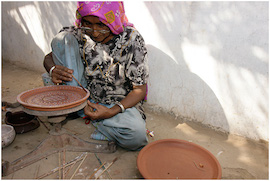
The successes, challenges, and lessons learned will become a policy brief and a teaching case, both written by WDI in collaboration with Professor Linda Scott of Oxford University’s Said Business School. Both documents will be published this spring, and are geared toward Walmart and other retailers looking to develop more effective sourcing programs in the future.
WDI Vice President of Scaling Impact Ted London and Research Manager Colm Fay, along with Scott, are studying two Walmart programs.
One is Empowering Women Together, which sources handicrafts from women-owned base of the pyramid businesses in East Africa, Nepal, India and other emerging markets to sell online. The other is Direct Farm, which buys fresh fruits and vegetables from small- and medium-sized farmers to supply Walmart’s stores in Central and South America, Mexico, South Africa, and India.
The team has interviewed managers from Walmart, the Walmart Foundation, and their implementing partners.
This is the second collaboration between WDI and Walmart. Last year, WDI Publishing released a case study on the evolution of a global cross-sector partnership between Walmart and the United States Agency for International Development (USAID). The case looked at what had been gleaned – both positive and negative – during the 15-year collaboration between the two organizations.
The free case, “Walmart and USAID: The Evolution of a Global Cross-Sector Partnership,” focused on partnerships that sought to engage smallholder farmers in the developing world, and highlighted examples from Honduras, Guatemala, Rwanda and Bangladesh. It explored the ways in which these collaborations came about, how they were supported by the partners, and the level of success achieved as measured by Walmart, the Walmart Foundation, and USAID.
The case also identified lessons learned for the future of the Walmart/USAID collaboration, and insights that may apply to the development of public-private partnerships for development more broadly.
In addition, NextBillion’s Kyle Poplin wrote a post on how the case was developed. And Beth Keck, senior director of Women’s Economic Empowerment at Walmart, sat down for a video interview with WDI’s London about the company’s global work.
Image courtesy of Navel Zaveri/Flickr.